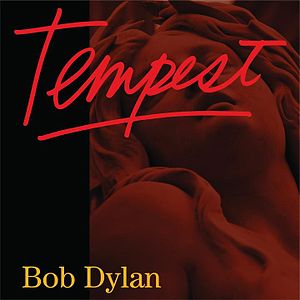“Duquesne Whistle” begins with a sound one would associate with a grainy cartoon or Chaplin short; once the song kicks in it gains a little more fuzz, with a jaunty organ part underneath. Robert Hunter, who’d supplied most of the lyrics for Together Through Life, does the same here; the rest is all Bob, or at least until somebody points out all the literary lifts. Meanwhile, good luck trying to get the image of that pinhead from the video out of your skull. “Soon After Midnight” lopes along nicely, along the lines of “Where Teardrops Fall” from Oh Mercy. While sadly not a cover of the David Gilmour song from Ummagumma, “Narrow Way” pounds its groove for several minutes. “Long And Wasted Years” sounds like a Lanois production in the intro, and something about the descending guitar brings to mind George Harrison’s solo stuff. His delivery, a cross between the shouted style of the ‘80s and the aw-shucks voice of the Basement Tapes, is enticing. With its toe-tapping arrangement, “Pay In Blood” might be the most commercial-sounding tune he’s done in 30 years. Its upbeat presentation becomes even weirder considering the content of the song. “Scarlet Town” is a little too closely related to “Ain’t Talkin’”, another song everybody likes but us, but at least it tries to tell a tale.
“Early Roman Kings” was the first song previewed from the album, and starts out sounding too much like “My Wife’s Home Town”—almost like he wanted to scare people into thinking the album would be Together Through Life Part 2. The idea of “early Roman kings in their sharkskin suits” is an interesting juxtaposition, and that’s just the beginning; the accordion is completely unnecessary and wheezes from top to toe. At nearly nine minutes and one chord, “Tin Angel” threatens to bore, but the story (something of an update of “Matty Groves”) is told well, with lots of twists. If that’s not long enough, the title track runs nearly fourteen minutes, a melodic rumination on the sinking of the Titanic, which seems to wander between actual accounts and red-herring references to the movie (fitting, since it’s in the same mood as “Red River Shore”, or another one of his movie songs we never bothered to memorize). The final epic is “Roll On John”, a tribute to John Lennon that gently tugs heartstrings. There’s a little slap-back Plastic Ono-style echo on the vocal, and the whole thing sounds very much like a big ship bobbing on the waves. It’s not the most complicated song, and many of the images don’t necessarily apply to the Beatle, but it’s the type of thing that will stick in your brain long after the disc has faded to silence.
Tempest is good, but not great, and that’s fine. It’s certainly an improvement on his last two regular albums, even Modern Times, a case where the ingredients were there but the recipe wasn’t accurate. He’s not all rasp, either—when he sings without pushing, he’s still incredibly smooth. We may elevate this to four stars eventually, but for now, we can strongly recommend it.
Bob Dylan Tempest (2012)—3½

Tempest is a snack when we wanted another feast......he's due...
ReplyDeleteIn my opinion, Tempest is great. Stunning. Beautiful. Astounding. Sweet. And I've been listening to Bob for 45 years.
ReplyDeleteRoll on, Bob. Fantastic Album.
ReplyDelete"Tempest" is the greatest Dylan album since "Time Out Of Mind", i think.
ReplyDeleteTempest is a good average LP for Dylan but it's no "Love & Theft". Together Through Life was hollow.Glad there is less Robert Hunter & more Dylan lyrics
ReplyDeleteTempest is a walk over well-worn foothills when you can't find a mountain to climb
ReplyDelete